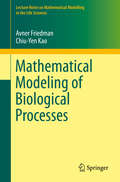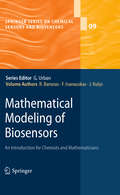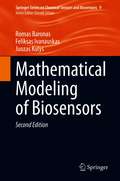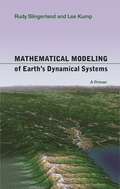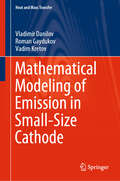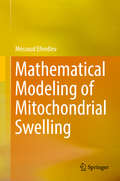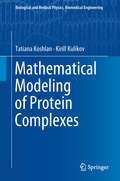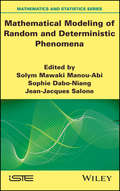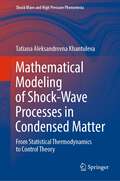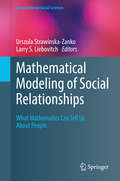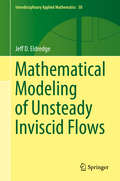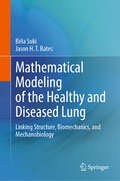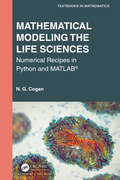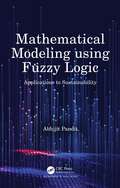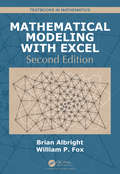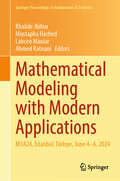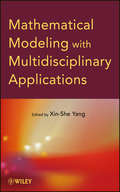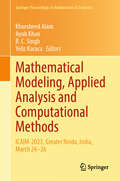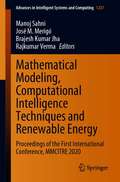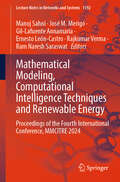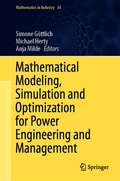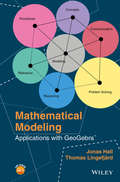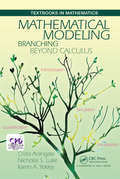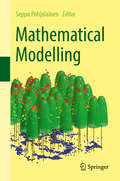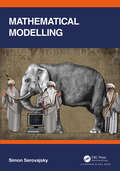- Table View
- List View
Mathematical Modeling of Biological Processes
by Avner Friedman Chiu-Yen KaoThis book on mathematical modeling of biological processes includes a wide selection of biological topics that demonstrate the power of mathematics and computational codes in setting up biological processes with a rigorous and predictive framework Topics include: enzyme dynamics, spread of disease, harvesting bacteria, competition among live species, neuronal oscillations, transport of neurofilaments in axon, cancer and cancer therapy, and granulomas. Complete with a description of the biological background and biological question that requires the use of mathematics, this book is developed for graduate students and advanced undergraduate students with only basic knowledge of ordinary differential equations and partial differential equations; background in biology is not required. Students will gain knowledge on how to program with MATLAB without previous programming experience and how to use codes in order to test biological hypothesis.
Mathematical Modeling of Biosensors
by Juozas Kulys Romas Baronas Feliksas IvanauskasThis book presents biosensor development and modeling from both a chemical and a mathematical point of view. It contains unique modeling methods for catalytical (amperometric, potentiometer and optical) biosensors. It examines processes that occur in the sensors' layers and at their interface, and it provides analytical and numerical methods to solve enzymatic kinetic and diffusion equations. The action of single enzyme as well as polyenzyme biosensors is studied, and the modeling of biosensors that contain perforated membranes and multipart mass transport profiles is critically investigated. Furthermore, it is fully described how signals can be biochemically amplified, how cascades of enzymatic substrate conversion are triggered, and how signals are processed via a chemometric approach and artificial neuronal networks. The results of digital modeling are compared with both proximal analytical solutions and experimental data.
Mathematical Modeling of Biosensors: An Introduction For Chemists And Mathematicians (Springer Series on Chemical Sensors and Biosensors #9)
by Juozas Kulys Romas Baronas Feliksas IvanauskasThis newly designed and enlarged edition offers an up-to-date presentation of biosensor development and modeling from both a chemical and a mathematical point of view. An entire new chapter in particular is dedicated to optimal design of biosensors. Two more new chapters discuss biosensors which utilize microbial cells and are based on carbon nanotubes respectively. All the other chapters have been revised and updated. The book contains unique modeling methods for amperometric, potentiometric and optical biosensors based mainly on biocatalysts . It examines processes that occur in the sensors' layers and at their interface, and it provides analytical and numerical methods to solve equations of conjugated enzymatic (chemical) and diffusion processes. The action of single enzyme as well as polyenzyme biosensors and biosensors based on chemically modified electrodes is studied. The modeling of biosensors that contain perforated membranes and multipart mass transport profiles is critically investigated. Furthermore, it is fully described how signals can be biochemically amplified, how cascades of enzymatic substrate conversion are triggered, and how signals are processed via a chemometric approach and artificial neuronal networks. The results of digital modeling are compared with both proximal analytical solutions and experimental data.
Mathematical Modeling of Earth's Dynamical Systems: A Primer
by Lee Kump Rudy SlingerlandA concise guide to representing complex Earth systems using simple dynamic modelsMathematical Modeling of Earth's Dynamical Systems gives earth scientists the essential skills for translating chemical and physical systems into mathematical and computational models that provide enhanced insight into Earth's processes. Using a step-by-step method, the book identifies the important geological variables of physical-chemical geoscience problems and describes the mechanisms that control these variables.This book is directed toward upper-level undergraduate students, graduate students, researchers, and professionals who want to learn how to abstract complex systems into sets of dynamic equations. It shows students how to recognize domains of interest and key factors, and how to explain assumptions in formal terms. The book reveals what data best tests ideas of how nature works, and cautions against inadequate transport laws, unconstrained coefficients, and unfalsifiable models. Various examples of processes and systems, and ample illustrations, are provided. Students using this text should be familiar with the principles of physics, chemistry, and geology, and have taken a year of differential and integral calculus.Mathematical Modeling of Earth's Dynamical Systems helps earth scientists develop a philosophical framework and strong foundations for conceptualizing complex geologic systems.Step-by-step lessons for representing complex Earth systems as dynamical modelsExplains geologic processes in terms of fundamental laws of physics and chemistryNumerical solutions to differential equations through the finite difference techniqueA philosophical approach to quantitative problem-solvingVarious examples of processes and systems, including the evolution of sandy coastlines, the global carbon cycle, and much moreProfessors: A supplementary Instructor's Manual is available for this book. It is restricted to teachers using the text in courses. For information on how to obtain a copy, refer to: http://press.princeton.edu/class_use/solutions.html
Mathematical Modeling of Emission in Small-Size Cathode (Heat and Mass Transfer)
by Vladimir Danilov Roman Gaydukov Vadim KretovThis book deals with mathematical modeling, namely, it describes the mathematical model of heat transfer in a silicon cathode of small (nano) dimensions with the possibility of partial melting taken into account. This mathematical model is based on the phase field system, i.e., on a contemporary generalization of Stefan-type free boundary problems. The approach used is not purely mathematical but is based on the understanding of the solution structure (construction and study of asymptotic solutions) and computer calculations. The book presents an algorithm for numerical solution of the equations of the mathematical model including its parallel implementation. The results of numerical simulation concludes the book. The book is intended for specialists in the field of heat transfer and field emission processes and can be useful for senior students and postgraduates.
Mathematical Modeling of Mitochondrial Swelling
by Messoud EfendievThe mathematical models considered in this book can help to understand the swelling of mitochondria. For the first time, it presents new mathematical models of mitochondrial swelling that take into account, in particular, spatial effects. The results presented here could make it possible to predict properties of the underlying biological mechanisms. Taking into account that mitochondria could move within a cell, lead to a PDE-PDE model. The book discusses the well-posedness and long-term dynamics of solutions, depending on boundary conditions reflecting the in vitro and in vivo cases. These analytical and numerical results have inspired colleagues from the Institute of Pharmacology and Toxicology of the Helmholtz Center Munich to design new experiments justifying the theoretical and numerical results that are obtained. The book is intended for graduates students and researchers with a solid mathematical background and an interest in cell biology.
Mathematical Modeling of Protein Complexes (Biological and Medical Physics, Biomedical Engineering)
by Kirill Kulikov Tatiana KoshlanThis book is devoted to the physical and mathematical modeling of the formation of complexes of protein molecules. The models developed show remarkable sensitivity to the amino acid sequences of proteins, which facilitates experimental studies and allows one to reduce the associated costs by reducing the number of measurements required according to the developed criteria. These models make it possible to reach a conclusion about the interactions between different amino acid chains and to identify more stable sites on proteins. The models also take the phosphorylation of amino acid residues into account. At the end of the book, the authors present possible directions of application of their physical and mathematical models in clinical medicine.
Mathematical Modeling of Random and Deterministic Phenomena
by Solym Mawaki Manou-Abi Sophie Dabo-Niang Jean-Jacques SaloneThis book highlights mathematical research interests that appear in real life, such as the study and modeling of random and deterministic phenomena. As such, it provides current research in mathematics, with applications in biological and environmental sciences, ecology, epidemiology and social perspectives. The chapters can be read independently of each other, with dedicated references specific to each chapter. The book is organized in two main parts. The first is devoted to some advanced mathematical problems regarding epidemic models; predictions of biomass; space-time modeling of extreme rainfall; modeling with the piecewise deterministic Markov process; optimal control problems; evolution equations in a periodic environment; and the analysis of the heat equation. The second is devoted to a modelization with interdisciplinarity in ecological, socio-economic, epistemological, demographic and social problems. Mathematical Modeling of Random and Deterministic Phenomena is aimed at expert readers, young researchers, plus graduate and advanced undergraduate students who are interested in probability, statistics, modeling and mathematical analysis.
Mathematical Modeling of Shock-Wave Processes in Condensed Matter: From Statistical Thermodynamics to Control Theory (Shock Wave and High Pressure Phenomena)
by Tatiana Aleksandrovna KhantulevaThis book offers an interdisciplinary theoretical approach based on non-equilibrium statistical thermodynamics and control theory for mathematically modeling shock-induced out-of-equilibrium processes in condensed matter. The book comprises two parts. The first half of the book establishes the theoretical approach, reviewing fundamentals of non-equilibrium statistical thermodynamics and control theory of adaptive systems. The latter half applies the presented approach to a problem on shock-induced plane wave propagation in condensed matter. The result successfully reproduces the observed feature of waveform propagation in experiments, which conventional continuous mechanics cannot access. Further, the consequent stress–strain relationships derived with relaxation and inertia effect in elastic–plastic transition determines material properties in transient regimes.
Mathematical Modeling of Social Relationships: What Mathematics Can Tell Us About People (Computational Social Sciences)
by Larry S. Liebovitch Urszula Strawinska-ZankoThis edited volume presents examples of social science research projects that employ new methods of quantitative analysis and mathematical modeling of social processes. This book presents the fascinating areas of empirical and theoretical investigations that use formal mathematics in a way that is accessible for individuals lacking extensive expertise but still desiring to expand their scope of research methodology and add to their data analysis toolbox. Mathematical Modeling of Social Relationships professes how mathematical modeling can help us understand the fundamental, compelling, and yet sometimes complicated concepts that arise in the social sciences. This volume will appeal to upper-level students and researchers in a broad area of fields within the social sciences, as well as the disciplines of social psychology, complex systems, and applied mathematics.
Mathematical Modeling of Unsteady Inviscid Flows (Interdisciplinary Applied Mathematics #50)
by Jeff D. EldredgeThis book builds inviscid flow analysis from an undergraduate-level treatment of potential flow to the level required for research. The tools covered in this book allow the reader to develop physics-based mathematical models for a variety of flows, including attached and separated flows past wings, fins, and blades of various shapes undergoing arbitrary motions. The book covers all of the ingredients of these models: the solution of potential flows about arbitrary body shapes in two- and three-dimensional contexts, with a particular focus on conformal mapping in the plane; the decomposition of the flow into contributions from ambient vorticity and body motion; generalized edge conditions, of which the Kutta condition is a special case; and the calculation of force and moment, with extensive treatments of added mass and the influence of fluid vorticity. The book also contains an extensive primer with all of the necessary mathematical tools. The concepts are demonstrated on several example problems, both classical and modern.
Mathematical Modeling of the Healthy and Diseased Lung: Linking Structure, Biomechanics, and Mechanobiology
by Béla Suki Jason H. BatesThe lung is a complex multiscale organ that serves as the primary interface between the environment and the tissues of the body. Homeostatic maintenance of lung function throughout life is essential for health. While failure of lung homeostasis underlies many of the most common chronic diseases that afflict mankind, the precise pathophysiologic mechanisms involved are often unclear. Investigative techniques such as microscopic imaging and atomic force microscopy are providing new insights into lung tissue properties at the micro scale. It nevertheless remains to be seen how this growing body of information can be integrated into a comprehensive picture of the lung. Mathematical and computational modeling has emerged as an essential tool for gaining such a holistic understanding. This book introduces the reader to the art of modeling as a means of linking lung structure to function over multiple length scales from the intracellular level to that of the whole organ, with specific attention given to the pathophysiology of a number of common lung diseases and aging.
Mathematical Modeling the Life Sciences: Numerical Recipes in Python and MATLAB® (Textbooks in Mathematics)
by N. G. CoganThe purpose of this unique textbook is to bridge the gap between the need for numerical solutions to modeling techniques through computer simulations to develop skill in employing sensitivity analysis to biological and life sciences applications. The underpinning mathematics is minimalized. The focus is on the consequences, implementation, and application. Historical context motivates the models. An understanding of the earliest models provides insight into more complicated ones. While the text avoids getting mired in the details of numerical analysis, it demonstrates how to use numerical methods and provides core codes that can be readily altered to fit a variety of situations. Numerical scripts in both Python and MATLAB® are included. Python is compiled in Jupyter Notebook to aid classroom use. Additionally, codes are organized and available online. One of the most important skills requiring the use of computer simulations is sensitivity analysis. Sensitivity analysis is increasingly used in biomathematics. There are numerous pitfalls to using sensitivity analysis and therefore a need for exposure to worked examples in order to successfully transfer their use from mathematicians to biologists. The interconnections between mathematics and the life sciences have an extensive history. This book offers a new approach to using mathematics to model applications using computers, to employ numerical methods, and takes students a step further into the realm of sensitivity analysis. With some guidance and practice, the reader will have a new and incredibly powerful tool to use.
Mathematical Modeling using Fuzzy Logic: Applications to Sustainability
by Abhijit PanditMathematical Modeling using Fuzzy Logic has been a dream project for the author. Fuzzy logic provides a unique method of approximate reasoning in an imperfect world. This text is a bridge to the principles of fuzzy logic through an application-focused approach to selected topics in engineering and management. The many examples point to the richer solutions obtained through fuzzy logic and to the possibilities of much wider applications. There are relatively very few texts available at present in fuzzy logic applications. The style and content of this text is complementary to those already available. New areas of application, like application of fuzzy logic in modeling of sustainability, are presented in a graded approach in which the underlying concepts are first described. The text is broadly divided into two parts: the first treats processes, materials, and system applications related to fuzzy logic, and the second delves into the modeling of sustainability with the help of fuzzy logic. This book offers comprehensive coverage of the most essential topics, including: Treating processes, materials, system applications related to fuzzy logic Highlighting new areas of application of fuzzy logic Identifying possibilities of much wider applications of fuzzy logic Modeling of sustainability with the help of fuzzy logic The level enables a selection of the text to be made for the substance of undergraduate-, graduate-, and postgraduate-level courses. There is also sufficient volume and quality for the basis of a postgraduate course. A more restricted and judicious selection can provide the material for a professional short course and various university-level courses.
Mathematical Modeling with Excel (Textbooks in Mathematics)
by Brian Albright William P FoxThis text presents a wide variety of common types of models found in other mathematical modeling texts, as well as some new types. However, the models are presented in a very unique format. A typical section begins with a general description of the scenario being modeled. The model is then built using the appropriate mathematical tools. Then it is implemented and analyzed in Excel via step-by-step instructions. In the exercises, we ask students to modify or refine the existing model, analyze it further, or adapt it to similar scenarios.
Mathematical Modeling with Modern Applications: M3A24, İstanbul, Türkiye, June 4–6, 2024 (Springer Proceedings in Mathematics & Statistics #497)
by Khalide Jbilou Mustapha Hached Lahcen Maniar Ahmed Ratnanihis book contains selected, peer-reviewed articles presented at the International Conference on Mathematical Modeling and Modern Applications (M3A_24), held in Istanbul, Türkiye, on June 4–6 2024. The selected articles are all real-life problem oriented and present numerical methods from the following fields: partial differential equations, approximation, applied linear and multilinear algebra, probability and statistics, artificial intelligence and deep learning. The developed tools are of special interest for understanding and taking an active part into the challenges posed by the increasing needs of the industry. A special focus is given to the large-scale methods in response to massive amount of data to process in many problems. Each article contains an initial section enabling non-specialists to grasp the issues at stake in the problem under consideration, as well as theoretical reminders and references enabling readers to deepen their understanding. This will enable researchers to present their advances, while at the same time allowing them to be disseminated to industry and students.
Mathematical Modeling with Multidisciplinary Applications
by Xin-She YangFeatures mathematical modeling techniques and real-world processes with applications in diverse fieldsMathematical Modeling with Multidisciplinary Applications details the interdisciplinary nature of mathematical modeling and numerical algorithms. The book combines a variety of applications from diverse fields to illustrate how the methods can be used to model physical processes, design new products, find solutions to challenging problems, and increase competitiveness in international markets.Written by leading scholars and international experts in the field, the book presents new and emerging topics in areas including finance and economics, theoretical and applied mathematics, engineering and machine learning, physics, chemistry, ecology, and social science. In addition, the book thoroughly summarizes widely used mathematical and numerical methods in mathematical modeling and features:Diverse topics such as partial differential equations (PDEs), fractional calculus, inverse problems by ordinary differential equations (ODEs), semigroups, decision theory, risk analysis, Bayesian estimation, nonlinear PDEs in financial engineering, perturbation analysis, and dynamic system modelingCase studies and real-world applications that are widely used for current mathematical modeling courses, such as the green house effect and Stokes flow estimationComprehensive coverage of a wide range of contemporary topics, such as game theory, statistical models, and analytical solutions to numerical methodsExamples, exercises with select solutions, and detailed references to the latest literature to solidify comprehensive learningNew techniques and applications with balanced coverage of PDEs, discrete models, statistics, fractional calculus, and moreMathematical Modeling with Multidisciplinary Applications is an excellent book for courses on mathematical modeling and applied mathematics at the upper-undergraduate and graduate levels. The book also serves as a valuable reference for research scientists, mathematicians, and engineers who would like to develop further insights into essential mathematical tools.
Mathematical Modeling, Applied Analysis and Computational Methods: ICAIM-2023, Greater Noida, India, March 24–26 (Springer Proceedings in Mathematics & Statistics #482)
by Yeliz Karaca Ayub Khan Khursheed Alam R. C. SinghThis volume presents a curated selection of papers presented at the International Conference on Applied and Industrial Mathematics (ICAIM 2023), hosted by Sharda University in Greater Noida, Uttar Pradesh, India, from 24-26 March 2023. It delves into diverse realms of mathematical modelling, applied analyses, computational methods and industrial mathematics. Each chapter within this collection offers intriguing insights into tackling real-world challenges through the lens of mathematical modelling and computational approaches. The book traverses an array of compelling subjects from safeguarding secrets through specialized codes to optimizing solar energy utilization. It illuminates how mathematics is potent in unravelling intricate problems, such as understanding disease propagation or enhancing machine learning algorithms. Through lucid explanations and engaging examples, this volume is tailored for curious minds eager to delve into the marvels of mathematics from fresh perspectives.
Mathematical Modeling, Computational Intelligence Techniques and Renewable Energy: Proceedings of the First International Conference, MMCITRE 2020 (Advances in Intelligent Systems and Computing #1287)
by José M. Merigó Rajkumar Verma Manoj Sahni Brajesh Kumar JhaThis book presents new knowledge and recent developments in all aspects of computational techniques, mathematical modeling, energy systems, applications of fuzzy sets and intelligent computing. The book is a collection of best selected research papers presented at the International Conference on “Mathematical Modeling, Computational Intelligence Techniques and Renewable Energy,” organized by the Department of Mathematics, Pandit Deendayal Petroleum University, in association with Forum for Interdisciplinary Mathematics, Institution of Engineers (IEI) – Gujarat and Computer Society of India (CSI) – Ahmedabad. The book provides innovative works of researchers, academicians and students in the area of interdisciplinary mathematics, statistics, computational intelligence and renewable energy.
Mathematical Modeling, Computational Intelligence Techniques and Renewable Energy: Proceedings of the Fourth International Conference, MMCITRE 2024 (Lecture Notes in Networks and Systems #1192)
by José M. Merigó Rajkumar Verma Ernesto León-Castro Manoj Sahni Gil-Lafuente Annamaria Ram Naresh SaraswatThe book is a collection of best-selected research papers presented at the Fourth International Conference on “Mathematical Modeling, Computational Intelligence Techniques and Renewable Energy (MMCITRE 2024),” organized by Department of Mathematics and Statistics, Manipal University Jaipur, Jaipur, Rajasthan, India. This book presents new knowledge and recent developments in all aspects of computational techniques, mathematical modeling, energy systems, applications of fuzzy sets and intelligent computing. The book provides innovative works of researchers, academicians and students in the area of interdisciplinary mathematics, statistics, computational intelligence and renewable energy.
Mathematical Modeling, Simulation and Optimization for Power Engineering and Management (Mathematics in Industry #34)
by Anja Milde Simone Göttlich Michael HertyThis edited monograph offers a summary of future mathematical methods supporting the recent energy sector transformation. It collects current contributions on innovative methods and algorithms. Advances in mathematical techniques and scientific computing methods are presented centering around economic aspects, technical realization and large-scale networks. Over twenty authors focus on the mathematical modeling of such future systems with careful analysis of desired properties and arising scales. Numerical investigations include efficient methods for the simulation of possibly large-scale interconnected energy systems and modern techniques for optimization purposes to guarantee stable and reliable future operations. The target audience comprises research scientists, researchers in the R&D field, and practitioners. Since the book highlights possible future research directions, graduate students in the field of mathematical modeling or electrical engineering may also benefit strongly.
Mathematical Modeling: Applications with GeoGebra
by Jonas Hall Thomas LingefjärdA logical problem-based introduction to the use of GeoGebra for mathematical modeling and problem solving within various areas of mathematics A well-organized guide to mathematical modeling techniques for evaluating and solving problems in the diverse field of mathematics, Mathematical Modeling: Applications with GeoGebra presents a unique approach to software applications in GeoGebra and WolframAlpha. The software is well suited for modeling problems in numerous areas of mathematics including algebra, symbolic algebra, dynamic geometry, three-dimensional geometry, and statistics. Featuring detailed information on how GeoGebra can be used as a guide to mathematical modeling, the book provides comprehensive modeling examples that correspond to different levels of mathematical experience, from simple linear relations to differential equations. Each chapter builds on the previous chapter with practical examples in order to illustrate the mathematical modeling skills necessary for problem solving. Addressing methods for evaluating models including relative error, correlation, square sum of errors, regression, and confidence interval, Mathematical Modeling: Applications with GeoGebra also includes: Over 400 diagrams and 300 GeoGebra examples with practical approaches to mathematical modeling that help the reader develop a full understanding of the content Numerous real-world exercises with solutions to help readers learn mathematical modeling techniques A companion website with GeoGebra constructions and screencasts Mathematical Modeling: Applications with GeoGebrais ideal for upper-undergraduate and graduate-level courses in mathematical modeling, applied mathematics, modeling and simulation, operations research, and optimization. The book is also an excellent reference for undergraduate and high school instructors in mathematics.
Mathematical Modeling: Branching Beyond Calculus (Textbooks in Mathematics)
by Crista Arangala Karen A. Yokley Nicolas S. Luke<p>Mathematical Modeling: Branching Beyond Calculus reveals the versatility of mathematical modeling. The authors present the subject in an attractive manner and flexibley manner. Students will discover that the topic not only focuses on math, but biology, engineering, and both social and physical sciences. <p>The book is written in a way to meet the needs of any modeling course. Each chapter includes examples, exercises, and projects offering opportunities for more in-depth investigations into the world of mathematical models. The authors encourage students to approach the models from various angles while creating a more complete understanding. The assortment of disciplines covered within the book and its flexible structure produce an intriguing and promising foundation for any mathematical modeling course or for self-study.</p>
Mathematical Modelling
by Esko Turunen Matti Heiliö Timo Lähivaara Erkki Laitinen Timo Mantere Jorma Merikoski Seppo Pohjolainen Kimmo Raivio Risto Silvennoinen Antti Suutala Tanja Tarvainen Timo Tiihonen Jukka Tuomela Marko Vauhkonenseppo PohjolainenThis book provides a thorough introduction to thechallenge of applying mathematics in real-world scenarios. Modelling tasksrarely involve well-defined categories, and they often requiremultidisciplinary input from mathematics, physics, computer sciences, orengineering. In keeping with this spirit of modelling, the book includes awealth of cross-references between the chapters and frequently points to thereal-world context. The book combines classical approaches to modellingwith novel areas such as soft computing methods, inverse problems, and modeluncertainty. Attention is also paid to the interaction between models, data andthe use of mathematical software. The reader will find a broad selection oftheoretical tools for practicing industrial mathematics, including the analysisof continuum models, probabilistic and discrete phenomena, and asymptotic andsensitivity analysis.
Mathematical Modelling
by Simon SerovajskyMathematical Modelling sets out the general principles of mathematical modelling as a means comprehending the world. Within the book, the problems of physics, engineering, chemistry, biology, medicine, economics, ecology, sociology, psychology, political science, etc. are all considered through this uniform lens. The author describes different classes of models, including lumped and distributed parameter systems, deterministic and stochastic models, continuous and discrete models, static and dynamical systems, and more. From a mathematical point of view, the considered models can be understood as equations and systems of equations of different nature and variational principles. In addition to this, mathematical features of mathematical models, applied control and optimization problems based on mathematical models, and identification of mathematical models are also presented. Features Each chapter includes four levels: a lecture (main chapter material), an appendix (additional information), notes (explanations, technical calculations, literature review) and tasks for independent work; this is suitable for undergraduates and graduate students and does not require the reader to take any prerequisite course, but may be useful for researchers as well Described mathematical models are grouped both by areas of application and by the types of obtained mathematical problems, which contributes to both the breadth of coverage of the material and the depth of its understanding Can be used as the main textbook on a mathematical modelling course, and is also recommended for special courses on mathematical models for physics, chemistry, biology, economics, etc.
